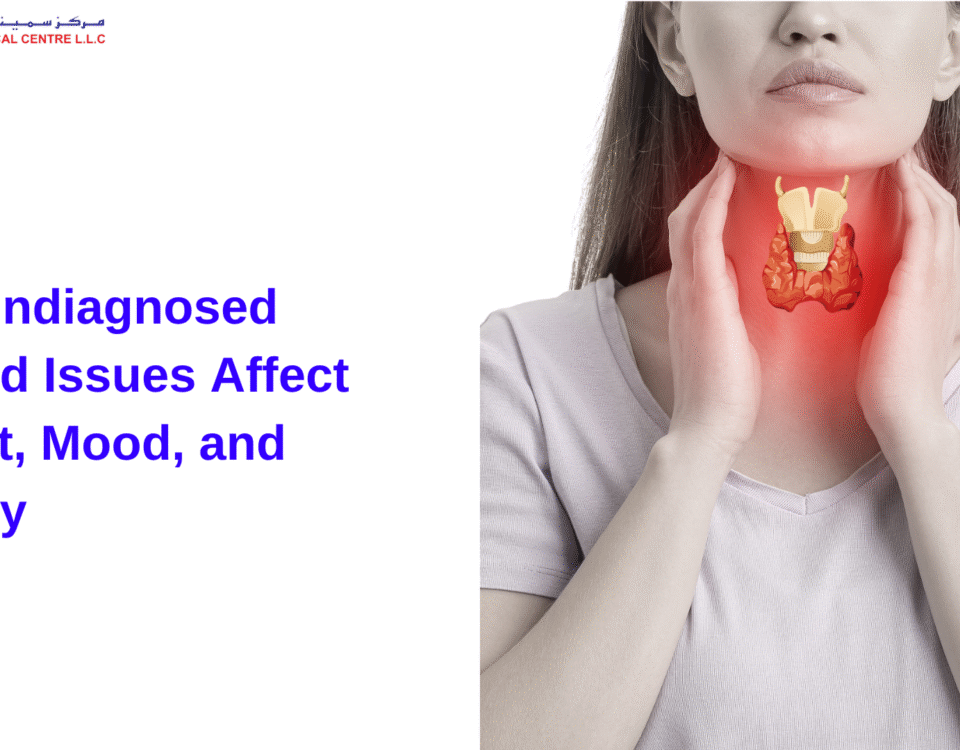
Why You’re Always Tired: Medical Reasons You Shouldn’t Ignore
July 7, 2025
How to Know If Your Hormones Are Out of Balance
July 14, 2025The Real Reason Behind Your Constant Headaches

A headache now and then is common, but if they’re happening regularly, affecting your focus, and no amount of rest or medication seems to help, it’s time to take a closer look. Constant headaches can be frustrating, exhausting, and often overlooked. But they can also be a sign of an underlying issue that needs medical attention.
At Sameena Medical Centre in Sharjah, we’ve helped countless patients uncover what’s really causing their recurring head pain.
In this blog, we’ll explore the major medical reasons behind chronic headaches and when to seek expert care.
When Is a Headache More Than Just a Headache?
Not all headaches are created equal. While some go away with hydration or rest, others stick around, making it difficult to work, sleep, or function normally.
Warning signs your headaches may be medical
Take note of these patterns, especially if your headaches:
- Occur three or more times per week
- Last for several hours or even days
- Don’t respond to over-the-counter medications
- Are accompanied by nausea, blurred vision, or sensitivity to light
- Strike suddenly and intensely
If these describe your experience, it’s time to investigate the root cause.
Top 6 Medical Reasons for Recurring Headaches
There are many types of headaches, but these six causes are among the most common culprits behind persistent pain:
1. Tension Headaches from Stress or Posture
Tension headaches are the most common type, caused by stress, anxiety, poor posture, or overuse of neck and shoulder muscles.
Why it happens:
- Prolonged tension causes muscles in the scalp and neck to tighten
- Feels like a constant, dull ache or pressure, often on both sides of the head
- Can worsen throughout the day or after long hours at a desk
Regular stretching, posture correction, and relaxation techniques can help reduce these headaches significantly.
2. Migraines and Neurological Sensitivity
Migraines are intense, throbbing headaches that can last from hours to days and often interfere with daily life.
Typical signs include:
- Pain on one side of the head
- Nausea, vomiting, or light/sound sensitivity
- Visual disturbances (auras), like flashes of light or blind spots
- Can be triggered by hormonal shifts, certain foods, dehydration, or sleep disturbances
Unlike other headaches, migraines often require specific medication and preventive strategies.
3. Sinus Pressure and Infections
Headaches from sinus infections are often misdiagnosed as migraines or tension headaches.
Key indicators:
- Pain around the eyes, nose bridge, or forehead
- Nasal congestion or postnasal drip
- Pain that worsens when bending over or lying down
- Seasonal allergies or frequent colds may increase risk
Treatment typically involves addressing the underlying infection or inflammation.
4. Eye Strain from Screens and Vision Issues
Staring at screens for long periods without breaks can lead to digital eye strain, a growing cause of headaches in today’s world.
Symptoms may include:
- Dull, frontal headaches after screen use
- Dry or irritated eyes
- Blurry vision or difficulty focusing
- Discomfort that improves after resting the eyes
The 20-20-20 rule (every 20 minutes, look at something 20 feet away for 20 seconds) can help reduce symptoms.
5. Dehydration and Dietary Triggers
Lack of water and skipping meals can directly affect blood vessels in the brain, leading to headaches.
What to watch for:
- Headache combined with fatigue or dizziness
- Triggered by fasting, alcohol, caffeine withdrawal, or certain foods (e.g., aged cheese, chocolate)
- Rapid relief after eating or drinking
Consistent hydration and balanced meals are essential to avoid these headaches.
6. High Blood Pressure or Medication Side Effects
In some cases, high blood pressure or certain medications may cause headaches, especially if blood pressure spikes suddenly.
Signs include:
- Pulsing or pounding headache, often at the back of the head
- May be accompanied by chest pain or shortness of breath
- Overuse of painkillers (like NSAIDs) can also lead to “rebound” headaches
Regular blood pressure monitoring and medication reviews can help pinpoint these sources.
When Should You See a Doctor for Headaches?
Occasional headaches are manageable, but frequent, worsening, or severe headaches should not be ignored.
You should seek medical attention if:
- Headaches occur more than twice a week
- Pain is progressively getting worse
- You experience blurred vision, confusion, or fainting
- Pain wakes you up at night
- You’ve started overusing painkillers with little relief
These may signal an underlying condition that needs medical intervention.
How Doctors Diagnose the Cause of Headaches
Understanding your headache pattern is the first step toward the right diagnosis. During a consultation, a doctor will:
- Review your medical history and headache diary
- Conduct a physical exam focusing on neck tension, vision, and neurological signs
- Check blood pressure, hydration status, and possible infection
- Recommend further testing, such as blood tests, eye exams, or MRI/CT scans, if needed
A correct diagnosis allows for targeted, effective treatment.
Treating Headaches at the Root, Not Just the Surface
Headache treatment depends entirely on its cause. Instead of just prescribing pain relief, long-term solutions may include:
- Stress management techniques like meditation or physical therapy
- Migraine-specific medications such as triptans or preventive drugs
- Treating sinus infections with antihistamines or antibiotics
- Corrective lenses or limiting screen time for eye strain
- Hydration, balanced diet, and blood pressure management
A tailored approach ensures fewer flare-ups and better quality of life.
How to Prevent Headaches Before They Start
If you’re prone to headaches, lifestyle habits can play a major role in prevention.
Try incorporating these tips:
- Drink 8–10 glasses of water daily
- Avoid skipping meals or caffeine withdrawal
- Follow the 20-20-20 rule for screen breaks
- Sleep 7–9 hours consistently every night
- Reduce stress with daily activity or relaxation techniques
- Maintain proper posture, especially during work hours
Prevention goes a long way in reducing both the frequency and intensity of headaches.
Conclusion
Constant headaches are not something you should have to “live with.” Whether the cause is physical tension, dehydration, hormonal changes, or a neurological issue, there is always a reason and often, a solution.
Book an appointment at Sameena Medical Centre in Sharjah to get to the root of your recurring headaches and finally find lasting relief.





